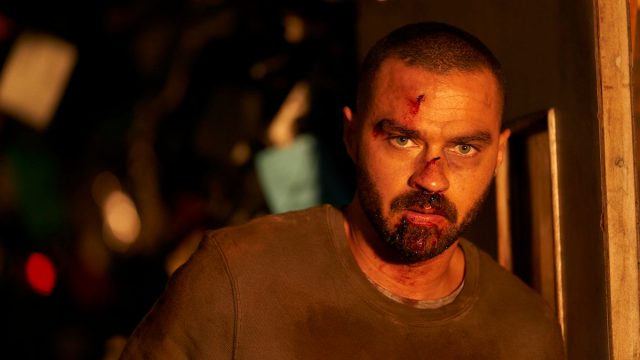Random Acts of Violence: Graphic but Not Novel, by David Bax

After he fulfilled the role of “The Scholar” in The Cabin in the Woods, it seems especially winking to cast Jesse Williams in another self-aware horror movie. But co-writer/director Jay Baruchel, in adapting Justin Gray and Jimmy Palmiotti’s graphic novel Random Acts of Violence, didn’t appear to consider that or, really, to think too deeply about anything at all. I never found much beneath the surface of Drew Goddard’s 2012 supernatural slasher satire but, compared to Baruchel’s movie, it’s erudite and sublime.
Williams stars as Todd, a celebrated independent comics writer whose cult hit series Slasherman, featuring a serial killer antihero, is coming to a close. Todd, along with his girlfriend, Kathy (Jordana Brewster), his publisher, Ezra (Baruchel), and assistant Aurora (Niamh Wilson) decide to commemorate the impending grand finale by road tripping from Toronto to New York City for a comics convention. Along the highways of upstate New York, though, they encounter a series of murders that bear an undeniable resemblance to events depicted in Slasherman.
As much as I want to complain here about the nauseously detailed nature of these tediously gruesome murders, I can’t say the title didn’t warn me. But, just in case you think it’s a joke, know that Random Acts of Violence is, indeed, very violent. Still, these scenes become repetitive and, despite running only 80 minutes, the movie goes on forever.
Maybe it would be more arresting if Baruchel and co-screenwriter Jesse Chabot gave us protagonists interesting enough that their peril gave us something to worry about instead of look forward to. But Todd’s entire character is defined by one event from his past that the film endlessly revisits, while Aurora and Ezra are one- and half-note characters, respectively. Kathy is the most potentially interesting as the woman who loves Todd but not his work. Yet any possibility of exploring that is left on the table.
Maybe we could have learned more about these people if they said things that were thoughtful or that a person might even believably say. Instead, all of the dialogue in Random Acts of Violence has the feel of bad improvisation; they constantly state what’s currently happening and they say “fuck” a lot.
Baruchel is less interested in exploring how his characters think than in telling us how he does. Random Acts of Violence leads with thick-headed point-making about artist responsibility. Todd deserves no blame because it’s society that’s violent, man (an argument risibly made by the scene in which a character fails to hear someone being murdered outside his window because he’s watching someone get murdered on a TV show). This juvenile, “let that sink in”-style argument was facile 25 years ago in Jhonen Vasquez’s Johnny the Homicidal Maniac comic. But at least there it was funny and artfully styled.






























